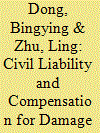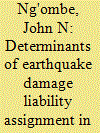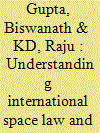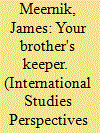|
|
|
Sort Order |
|
|
|
Items / Page
|
|
|
|
|
|
|
| Srl | Item |
| 1 |
ID:
167520


|
|
|
|
|
| Summary/Abstract |
The International Convention on Liability and Compensation for Damage in Connection with the Carriage of Hazardous and Noxious Substances by Sea (the HNS Convention) has not entered into force. In China, a two-tier compensation regime has been established for vessel-source oil pollution damage, but this regime does not address damage in connection with the carriage of HNS by sea. This article examines the Chinese law approach to civil liability and compensation for damage in this respect, and discusses whether there is an adequate framework in place to address issues that may arise.
|
|
|
|
|
|
|
|
|
|
|
|
|
|
|
|
| 2 |
ID:
105118


|
|
|
|
|
| Publication |
2011.
|
| Summary/Abstract |
In an information society, granting the Internet Service Provider (ISP) exemption from liability under certain circumstances is an important approach to strike a balance between the interests of the copyright holder, the ISP and the public. Although many countries conditionally provide safe harbour protection for online services, the certainty, feasibility and efficiency of the relevant provisions are different from one country to another. This article reviews China's approach to limitation of the ISP's liability from a perspective of legislation and judicial practice, compares differences in this context between China, the US and EU, and based on which discusses the feasible options for China to increase the certainty of law and inconsistency in judicial practice.
|
|
|
|
|
|
|
|
|
|
|
|
|
|
|
|
| 3 |
ID:
180092


|
|
|
|
|
| Summary/Abstract |
Over the next three decades, it is likely that on the order of 100 U.S. nuclear power reactors—almost the entire U.S. nuclear fleet, which at its peak in 1990 operated 112 commercial reactors—will be shut down and decommissioned. Decommissioning is a costly, time-consuming process that involves removing or decontaminating all radioactive infrastructure and related materials on site to prevent risks to public health so that the land can be safely used for other beneficial purposes. Though federal regulations have required that plant licensees prepare financially for this eventuality, we argue that particularly in light of commonly used corporate structures designed to strictly segregate financial risks, and under the current energy market conditions, the financial regulations in place may be insufficient in some exigent situations to ensure successful decommissioning. We explore available options for legal recourse if funding is inadequate in a corporate law context and pursuant to existing federal law. We comment on the possibility that taxpayers might be required to shoulder all or part of the financial liability at “legacy” plants in the absence of structural changes.
|
|
|
|
|
|
|
|
|
|
|
|
|
|
|
|
| 4 |
ID:
166729


|
|
|
|
|
| Summary/Abstract |
Scientific evidence suggests earthquakes occurring in Oklahoma since 2009 are not “acts of God”, but very likely triggered by wastewater injection in disposal wells by oil and gas (O&G) companies. While sustaining the O&G industry's contribution to the economy is generally important, achieving environmental and public protection may in part rely on how earthquake inducers are held liable for damage. We use a Bayesian Tobit censored model, estimated using Markov Chain Monte Carlo (MCMC) methods to determine factors that influence public preferences for how much liability O&G companies should assume for induced earthquake-related damage. Data are from a survey of Oklahomans collected in 2017 by Survey Sampling International (SSI). Results suggest people would, on average, hold O&G companies liable for 75% of the earthquake damage. We find socio-demographic, earthquake, locational, and O&G industry-related factors as the main drivers of earthquake damage liability. However, their effects on damage liability vary between respondents that have had their property damaged by earthquakes and those that in some way benefit from O&G companies through jobs and gas-leases. We provide insights by which individuals might lobby representatives to impose new liability or regulatory mechanisms on O&G companies to avoid or compensate for earthquake damage.
|
|
|
|
|
|
|
|
|
|
|
|
|
|
|
|
| 5 |
ID:
138225


|
|
|
|
|
| Summary/Abstract |
With the rising number of man-made space objects, space situational awareness becomes increasingly important for space faring nations. International cooperation and exchange of data and information are prerequisites. Different forms of cooperation are possible and national policies have an impact. New players of the information industry can take over roles in space situational awareness. This article examines how principles like international cooperation, responsibility, liability and the obligations to register space objects under the existing space treaties apply to space situational awareness.
|
|
|
|
|
|
|
|
|
|
|
|
|
|
|
|
| 6 |
ID:
149603


|
|
|
|
|
| Summary/Abstract |
Concerns about the threat that space debris pose to satellites are expected to increase as the number of mostly non-maneuverable microsatellites in low-Earth orbit grows. International guidelines developed to mitigate the risk from space debris are frequently not followed, however, and may not be able to cope with the dramatic growth expected in the number of satellites. Moreover, the current legal framework is unable to determine who is liable for losses in an on-orbital collision. A space surveillance data-sharing committee is proposed to solve this liability problem. Under the proposed liability rules, satellite operators would be liable for the debris they create and insurance companies would cover such a risk, creating a new financial incentive for operators to adopt space debris mitigation guidelines.
|
|
|
|
|
|
|
|
|
|
|
|
|
|
|
|
| 7 |
ID:
193255


|
|
|
|
|
| Summary/Abstract |
Article 8 of the Paris Agreement introduces obligations upon the Parties to the Agreement “with respect to Loss and Damage associated with adverse impacts of climate change.” According to Paragraph 52 of the Conference of the Parties’ Decision, Article 8 is not a basis for liability or compensation. Therefore, the problem is whether violation of obligations leads to a state responsibility. Using a dogmatic method, this research contends that “recognizing the significance of averting, minimizing, and addressing Loss and Damage” means acceptance of responsibility for a breach of obligations. Although the means of seeking reparation would not be compensation, States are obliged to eliminate sources of damage and take precautionary measures to address loss and damage. Notwithstanding this, placing the issue of loss and damage under the Agreement into a separate article can reflect to a great extent the significance of the matter.
|
|
|
|
|
|
|
|
|
|
|
|
|
|
|
|
| 8 |
ID:
170637


|
|
|
|
|
| Summary/Abstract |
The status and liability of non-governmental entities for commercial use of outer space activities on behalf of space launching states are not very clear under the existing space law regimes. Non-governmental entities are those who carry private space activities such as commercial launching, supplying different equipment or parts to space agencies and manufacturing spacecraft and satellite. The possible litigation relating to the commercial activities are mainly the financial consequence of damage caused and also the technical complications that private entities face in case of supply of defaulted parts to the space agencies. According to Article VI of the Outer Space Treaty 1967 and Articles II and III of Liability Convention 1972, launching country is liable for any activities in outer space. Even in the case of non-governmental activities, the launching state is liable. Therefore, in the event of any commercial activity from any sovereign states, the state is liable for any accidents and consequential damages.
This article focusses on specific issues such as liability for commercial outer space activities of nongovernmental entities in the existing international space law regimes. It explores the applicable principle of space law and international law in outer space activities. The work also focusses on the impact on space liability regime as well as on the legal efficiency of the links between private entities and state liability. This exercise is important in the background of the increasing number of private spacecrafts scheduled for launching in the future.
|
|
|
|
|
|
|
|
|
|
|
|
|
|
|
|
| 9 |
ID:
185686


|
|
|
|
|
| Summary/Abstract |
An important goal of EU energy policy is to ensure energy justice during the green transition. The Commission considers the functioning and competitiveness of the retail energy market for households to be proxies for justice and consumer welfare. The European Barriers in Retail Energy Market Project (the EB Project) is instrumental in assessing and ensuring this competitiveness. The EB Project centres on the creation of the Barrier Index (BI), which identifies barriers to entry in the national markets for electricity and gas suppliers across the EU and ranks Member States on the basis of eight indicators. This article critically assesses the reliability of the BI. A faulty BI could lead Member States down the wrong path or towards bad decisions with respect to the regulation of the retail energy market in light of the EU's policy goals. This research identifies problems with the methodology and data collection regarding the construction of the BI indicators in the electricity market specifically. The latter is exemplified through case studies of the Dutch and Portuguese national reports. The identified issues call into question the reliability of the BI as a whole. Possible measures to improve the quality of indicators are discussed in the conclusions.
|
|
|
|
|
|
|
|
|
|
|
|
|
|
|
|
| 10 |
ID:
165254


|
|
|
|
|
| Summary/Abstract |
States have long employed other actors, including other states and nonstate actors, as fighting forces to help them achieve the national security objectives that they are unwilling or incapable of realizing unilaterally. In the international courts in recent years, however, there has been the increasing willingness to hold individuals accountable for violations of international law committed by those forces to whom they are providing assistance. For example, the Special Court for Sierra Leone found President Charles Taylor of Liberia guilty of aiding and abetting forces in Sierra Leone that repeatedly violated international law and inflicted untold human suffering on the people of that country. After delineating the legal risks facing state leaders that provide support to third party actors, I delve into conflict data to determine just how widespread the problem is. I examine the frequency with which actors commit violations of international law, and in particular the targeting of innocent civilians, and the extent to which such forces are being assisted by external actors. I find that this problem is prevalent and that many major powers have provided assistance to allies that violate international law.
|
|
|
|
|
|
|
|
|
|
|
|
|
|
|
|
|
|
|
|
|